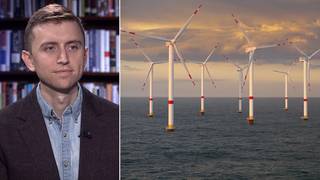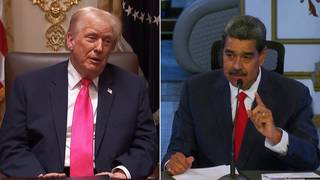
The Liberal Party in Canada had been massively trailing in the polls. Then it pulled off a victory that seemed impossible just two months ago, largely thanks to one man: President Donald Trump, who repeatedly threatened to make Canada the 51st state. After former Prime Minister Justin Trudeau resigned, former central banker Mark Carney took over as Liberal leader and campaigned as someone willing to stand up to the United States, while painting the opposition Conservatives as too close to a hostile Trump administration. “If you’d asked people around Christmas if the Liberal Party had any chance of forming government in the next election, they would have said, 'Absolutely not,'” says Canadian tech writer and critic Paris Marx, who notes that Carney has quickly moved to weaken some of his party’s more progressive policies and cozy up to tech executives. “So, even though we have a Liberal Party coming to power over a Conservative Party, that doesn’t mean there aren’t things to still be worried about, as we see the way that they might potentially govern.”
Transcript
AMY GOODMAN: We begin today’s show in Canada, where the Liberal Party has pulled off a victory that seemed impossible just two months ago, largely thanks to one man: President Donald Trump, who’s repeatedly threatened to make Canada the 51st state. Prime Minister Mark Carney and his Liberal Party won 169 out of 343 seats in Parliament, narrowly failing to win a majority of seats.
Carney, who’s a former central banker, has served as prime minister only in March, after Justin Trudeau resigned. When Trudeau first announced his plan to resign, the Conservatives had a significant lead in the polls. It looked like Conservative leader Pierre Poilievre was set to become Canada’s next prime minister. But on Monday, he suffered a major defeat. He even lost his own seat in the Parliament. The campaign shifted once President Trump began threatening Canada’s sovereignty and imposed new tariffs on Canada. As Trump escalated his threats, the Liberal Party soared in popularity.
This is Prime Minister Mark Carney speaking at a victory rally Monday night.
PRIME MINISTER MARK CARNEY: America wants our land, our resources, our water, our country.
CARNEY SUPPORTERS: Never! Never!
PRIME MINISTER MARK CARNEY: Never. But these are not — these are not idle threats. President Trump is trying to break us so that America can own us. That will never — that will never, ever happen. …
Our old relationship with the United States, a relationship based on steadily increasing integration, is over. The system of open global trade, anchored by the United States, a system that Canada has relied on since the Second World War, a system that, while not perfect, has helped deliver prosperity for our country for decades, is over. These are tragedies, but it’s also our new reality. We are over — we are over the shock of the American betrayal, but we should never forget the lessons.
CARNEY SUPPORTER: But you’re going to take us forward!
PRIME MINISTER MARK CARNEY: We have to look out for ourselves.
AMY GOODMAN: Canadian Prime Minister Mark Carney, speaking at his victory event.
President Trump called Carney on Tuesday to congratulate him. Meanwhile, White House Deputy Press Secretary Anna Kelly said, “The election does not affect President Trump’s plan to make Canada America’s cherished 51st state,” unquote.
On Monday night, the Conservative leader Pierre Poilievre pledged to work with the Liberal Party.
PIERRE POILIEVRE: Conservatives will work with the prime minister and all parties, with the common goal of defending Canada’s interests and getting a new trade deal that puts these tariffs behind us while protecting our sovereignty and the Canadian people.
AMY GOODMAN: While the Liberal Party in Canada pulled off what’s been described as a “stunning comeback,” support for the left-leaning New Democratic Party, or NDP, collapsed. The party lost official party status. The party’s leader, Jagmeet Singh, lost his own seat.
To talk more about the Canadian elections and U.S.-Canada relations — we’ll then talk with him about Elon Musk — we’re going to St. John’s, Newfoundland, where we’re joined by the journalist Paris Marx. He hosts the podcast Tech Won’t Save Us and writes the Disconnect newsletter, where his latest article is headlined “Canada’s tech executives aren’t scared of Mark Carney.”
Paris, thanks so much for being with us. Why don’t you start off on the Canadian — the surprising Canadian victory? Not surprising from this election, but from a month before. The harder President Trump went after Canada, the more the Liberal Party rose in the polls, until ultimately the prime minister was elected.
PARIS MARX: Yeah. It’s great to join you this morning.
It was really a stunning turnaround over the past few months. If you’d ask people, you know, around Christmas if the Liberal Party had any chance at forming government in the next election, they would have said, “Absolutely not. It’s not happening.” But now we see Mark Carney is poised to form a minority government, but it’s a strong minority government. You know, he’s only three seats away from a majority, so that won’t be very difficult to govern with, whereas the Conservative Party has still increased, actually, their vote share and their number of seats, but the leader, as you said in your opening, you know, lost his seat, and it’s still unclear what exactly he is going to do to try to gain representation or if the party is going to try to get rid of him.
And I think one of the biggest stories of the election is, as you said, you know, the real decimation of the smaller parties, whether it’s the New Democratic Party on the center-left, which has been reduced to just seven seats, which is below the line for official party status in Canada, which means that it won’t get many resources, will have limited questions, things like that, in Parliament, but also the Bloc Québécois, which saw its number of seats drop by 10, and the Green Party, which saw its number of seats drop from two to one. And a lot of that vote went to the Liberal Party, because people felt, seeing what was happening with Donald Trump and the threats that he was making against Canada, that this was not a time to allow the Conservative Party, and especially a Conservative Party leader that was using some of that Trumpian language, to be the one who kind of represents us in these negotiations with the United States, and, you know, in this moment where it looks like Canada is going to have the difficult task of rethinking kind of the status quo that the economy was built on for the past several decades.
JUAN GONZÁLEZ: And, Paris, could you talk more about the impact that the Trump tariffs and the Trump threats to make Canada a 51st state have had on the Canadian population?
PARIS MARX: Yeah, absolutely. It’s been huge, right? People in Canada feel really betrayed and really angry about what is happening, because, you know, the United States is the country and Americans are the people who we arguably have the closest relationship to in the world, right? You know, we consume so much of the same culture. We have — there are so many kind of relatives and friends that live on both sides of the border. And so, this real kind of shift from the American administration to really be targeting Canada has really affected a lot of Canadians and how a lot of Canadians feel about the United States, as well. And that — you know, as you said in your opening, that is part of what contributed to this election victory.
Of course, Justin Trudeau, the old prime minister, stepped aside as Liberal leader just a couple weeks before Donald Trump was inaugurated in January, and that opened the way for a new leader to come in to really be a representation of this anger and of the public mood. And Mark Carney seized that very effectively and kind of allowed Canadians to rally around the Liberal Party again to represent the kind of nationalism that people are feeling in this moment in response to the trade war that has been begun by Donald Trump and seems to be targeted very specifically on Canada more than many other countries in the world — of course, Mexico, as well. And, you know, so that has been very significant. And there’s a lot of Canadians now who say that, “Yeah, we might have a difficult time ahead in dealing with the United States, but we are ready to accept some economic pain in order to push back and kind of defend our interests.”
JUAN GONZÁLEZ: Now, you’ve posted on social media that most of Canada’s top tech executives turned against the Liberals and were betting that the Conservatives would win, but that they don’t have much to fear now under Carney as the nation’s new leader.
PARIS MARX: Yeah, exactly. So, around this time last year, the Liberal Party under Justin Trudeau put out its annual budget, and in that budget was a proposal to increase the amount of taxes that people had to pay on capital gains. Now, that would only affect 0.13% of Canadians, these increases that were proposed. But as you can imagine, people in the tech industry are disproportionately likely to earn income through capital gains, and they got very angry as a result of that. So, you know, kind of a worsening relationship between large tech executives in Canada and the Liberal Party came out into the open at that moment, and there was a real embrace of the Conservative Party. Over the past year, we have seen a number of Canadian tech executives embrace more right-wing policy positions. The industry has come together to create an organization called Build Canada to advocate for some of those positions. And even since Trump came to office, we saw some of those people making explicit arguments that Canada should have its own DOGE, you know, with all the consequences that, of course, we’ve seen in the United States as a result of that agency and Elon Musk’s leadership of it.
And so, you know, now you would imagine that with the Liberals returning to power, that there would probably be a pretty bad relationship between those tech executives and the Liberal Party. But, actually, Mark Carney, one of his first actions as prime minister was to remove that increase in the capital gains tax, and he has been talking a lot about investing in artificial intelligence, investing in the tech industry, rolling out AI in the public sector to increase efficiency. So, even though we have a Liberal Party coming to power over a Conservative Party, that doesn’t mean there aren’t things to still be worried about, as we see the way that they might potentially govern in the years ahead.
AMY GOODMAN: And talk about how unusual Mark Carney is, not a politician but a central banker, and what that means.
PARIS MARX: Yeah, it’s very significant, right? And I think we’re still at the moment where Canadians are really discovering who Mark Carney actually is. You know, he does not have a political career. He previously worked at Goldman Sachs before serving as the head of the Bank of Canada during the financial crisis in 2008, and then he served as head of the Bank of England during the Brexit crisis and through that period. He was the first Canadian to serve as head of the Bank of England. Beyond that, he has worked at a company called Brookfield Asset Management, and there has been some controversy around that with, you know, the kind of tax maneuvers and tax dealings that it has had, that kind of played out during the election but that people don’t seem to have really focused too much on when it came to thinking about their vote.
I would say the big thing about Mark Carney right now is he is still very new to Canadians, right? He was only prime minister for, I believe, nine days before calling the election. And so, a lot of people were kind of able to put their hopes into Mark Carney, you know, regardless of where he actually stands. And now we’re in this moment where he is actually going to prove that he can follow through on the promises that he made. And so, now he enters a much more difficult period than he had over the past five or six weeks as he began as prime minister and then ran this very short election campaign, because, as you’ll know, our elections in Canada are a lot quicker than the ones that happen in the United States.











Media Options